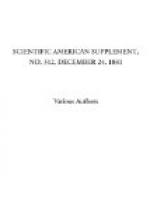* * * * *
M. Bouchut’s experiments with pepsine for destroying worms in the stomach and bowels have been continued with extremely promising results. Even the tapeworm succumbs to the digestive action of pepsine in large doses, while the more highly organized tissues of the stomach are unaffected.
* * * * *
FRANZ LISZT.
On the 22d day of October, 1811, Franz Liszt, the greatest pianist of the last half century, was born at Raiding, in Hungary, and the entire musical world was united in celebrating his seventieth birthday, which took place this year.
What can be more appropriate than to take a look at the past and recall some of the important events of Liszt’s so very interesting life? To recall his first appearance as a “wonder” child in his native town, the blessing and kiss he received a few years later from the immortal Beethoven, his great triumphs in the Paris salons and the defeat of his rival Thalberg. After the appearance of the violin virtuoso Paganini, he resolved to attain the highest development of his musical genius and to become so world-renowned as none has been before him, and in this was successful. He has not only maintained his standing as the greatest master of modern piano virtuosos, but has had the greatest influence on his followers and scholars, Taussig, v. Bulow, Mr. and Mme. Bronsart, Menter, and other younger and older pianists who have had the benefits of his instruction for a greater or less length of time, so that it can be justly claimed that the majority of our present virtuosos owe their success and fame directly or indirectly to the abilities of Liszt.
Liszt is endowed with that great gift of treating every individual in the manner most favorable to the development of its traces of artistic ability and desires, and this accounts for his wonderful results as instructor and master.
[Illustration: FRANZ LISZT.]
But no picture of Liszt would be perfect without a resume or recapitulation of his compositions.
After a most perfect transposition and preparation of numerous works of Beethoven, Schubert, and Berlioz, and after making their compositions popular and introducing numerous valuable novelties in the art of playing piano, he produced his “Symphonische Dichtungen” (Symphonic Poems).
These highly dramatic compositions, in which he follows Berlioz and often produces the most astonishing effects of sounds, however, did not find entire approbation with the public, and did not succeed in popularizing themselves. But that fact can be recorded in his favor that every programme containing Liszt’s “Dante,” or Faust Symphony, or “Mazeppa,” receives more than ordinary attention from the public. The same is the case with his solo songs with piano accompaniment, in which, however, ingenious details




